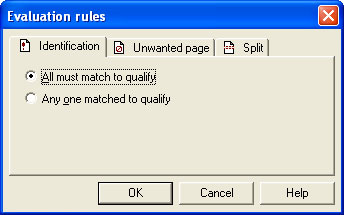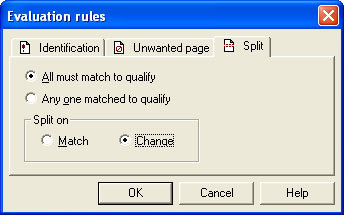|
After the identification, unwanted and split rules have
been defined it is important to configure the rule evaluation
for each entry in the rule file. The evaluation method of each
type of rule (identification, unwanted and split) can be set so
that either all rules must match or any rule must match.
In some instances you may need to create a combination of
rules to successfully split/identify your data. For instance,
you would need more than one evaluation rule to determine the
difference between an invoice and a reprinted invoice.
FTSplitDef will allow you to define how multiple rules are
handled by the FTSplit in two ways:
- All must match to qualify - means that
for this entry to succeed, the data in all of the rules must
match.
- Any one matched to qualify - means that
only one, or any combination of, the rules must match for
success.

Split rules can be further controlled. Split rules can be set to:
- Split on match - meaning that the rule
must exactly match to succeed. For
example, a split rule using the page number would split the
document when the page number was equal to, or “matched”
the value 1. Use leading and trailing spaces to
avoid splitting on page numbers 10, 11, 12, 100, 101, 102
etc.
- Split on change - meaning that if the
text in the rule changes the rule succeeds.
For instance, a split rule on a change in the customer number
splits when a new customer number was present.

To configure the rule evaluation for each entry:
- Select Evaluation Rules from the
Rules menu.
- For each rule type, set whether all rules or at least
one rule must be satisfied before the action occurs.
- On the Split tab, select the correct
Split on option.
- Click on the OK button.
|

 Overview
Overview Loading Data File
Loading Data File Entry
Entry Rules
Rules Identification
Identification Unwanted Pages
Unwanted Pages Split
Split Properties
Properties Evaluation Rules
Evaluation Rules Options
Options Splitting
Splitting Examples
Examples

